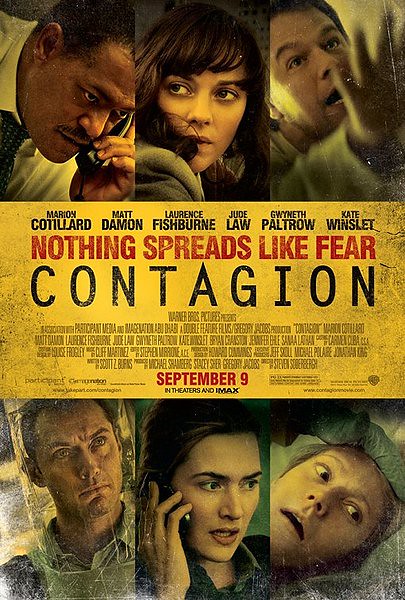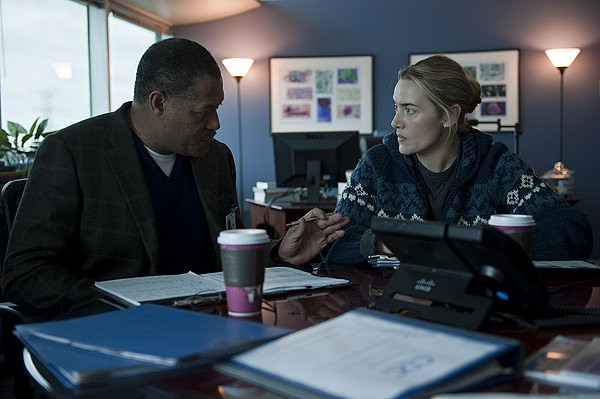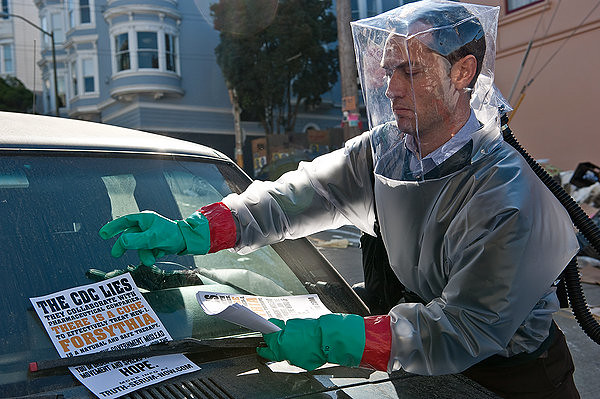"Blogging isn't writing. It's graffiti with punctuation."
Dr. Ian Sussman in Contagion (2011)
Bloggers of the world! Unite!
 |
| Soderbergh spelled out the movie in its tagline because he thinks you are stupid. |
Last Thursday night, I made contact with Steven Soderbergh's Contagion, a disaster film like no other I have ever seen. It's best described as a movie length procedural chronicling how every level of human society would respond to a pandemic motored by a highly transmissible, highly virulent virus previously unknown to science. The virus is also fictional, but just barely (I will put on a labcoat and explain what I meant by that in a bit).
In many ways, it's almost a documentary in its very clinical and hyper-realistic account of what would happen in the event of a worldwide plague. Four out of four doctors agree (that was what my movie party consisted of, by the way) that it's almost a public service announcement. We did however, differed in our enjoyment of the film. I unabashedly loved it. The others thought it was more education than entertainment and opined that if you're looking for a good time at the movies, you won't find it in Contagion. It very bleak, brutal and unpredictable, much like how a real life pandemic is.
Warning: This doctor recommends that you watch the movie before reading this review slash armchair analysis. There is no known cure for spoilers.
The Virus.
The real star of the film, the MEV-1 virus, is based on our very own, real-life Nipah virus - one of Malaysia's rare honest contributions to the world of medicine. It was named after Kampung Nipah in Negeri Sembilan where it was first isolated from a human infectee (there's also a Tioman virus, if you're interested). Like Nipah, the MEV-1 is a respiratory paramyxovirus and encephalitic agent, and for those of you who don't understand scientish, "encephalitic" pretty much means "it eats braaains". Nipah too is spread primarily through touch, and typically presents itself through flu-like symptoms (fever, headaches, muscle aches, sore throat, etc) and neurological signs (like drowsiness, altered consciousness and cinematic dramatic seizures). It may scare you to know that Nipah typically kills 40-75% of its victims and severe sporadic outbreaks had been recorded almost yearly since its discovery in 1999. Yes, the scenario in Contagion can totally happen.
Another noteworthy trivia is MEV-1's origin story which is blow-by-blow identical to the proposed mechanism from which Nipah first arose - from the spillage of excrements and half-eaten fruits from Pteropid fruit bats into pig farms due to the increasing overlap of habitats these two animals share - or as the film puts it: "Somewhere out there, the wrong pig met up with the wrong bat."
The scientific aspects of this film are surprisingly accurate and its accuracy, by and large, can be credited to Contagion's science consultant, Ian Lipkin, the Director of the Center for Infection and Immunity, an academic laboratory for microbe hunting in acute and chronic diseases. It was he whocreated selected the film's virus, going as far as constructing the genetic map of the MEV-1 using sequences of paramyxoviruses he downloaded from GenBank. The Paramyxoviridae is a family of viruses which boasts the inclusion of common household names like mumps and measles, but I bet you already knew that.
I do however have a minor plausibility issue with a story element in Contagion where limited supply (a recognised logistic problem with vaccines in real life pandemic responses) forced the distribution of the newly-developed vaccine to be decided by a lottery based on a person's date of birth. In reality, the vaccines would be first given to doctors and nurses - because let's face it, who's going to help the ordinary folks after all the healthcare providers have keeled over and died? That scene where Dr Ellis Cheever gave his dose of vaccine to his janitor's kid while putting the wristband which marks those protected on himself was meant to be heartwarming, but it elicited a "what a fucking moron" from me and my friends. He's essentially turned himself into a walking public health hazard.
The scientific aspects of this film are surprisingly accurate and its accuracy, by and large, can be credited to Contagion's science consultant, Ian Lipkin, the Director of the Center for Infection and Immunity, an academic laboratory for microbe hunting in acute and chronic diseases. It was he who
I do however have a minor plausibility issue with a story element in Contagion where limited supply (a recognised logistic problem with vaccines in real life pandemic responses) forced the distribution of the newly-developed vaccine to be decided by a lottery based on a person's date of birth. In reality, the vaccines would be first given to doctors and nurses - because let's face it, who's going to help the ordinary folks after all the healthcare providers have keeled over and died? That scene where Dr Ellis Cheever gave his dose of vaccine to his janitor's kid while putting the wristband which marks those protected on himself was meant to be heartwarming, but it elicited a "what a fucking moron" from me and my friends. He's essentially turned himself into a walking public health hazard.
The Film.
Contagion doesn't have characters in the traditional sense of the word - going against every good advice there is on good film-making. If an unproven director had made it, I'd have chalked it up to crappy direction but it was most certainly a calculated decision on Soderbergh's part. What it has instead of characters are broadly-painted points of view. In Matt Damon, we get the ground level everyman's perspective. Laurence Fishburne represents the decision-making upper echelons of public health as a high-ranking officer of the CDC. Marion Cottilard plays the WHO epidemiologist who went on a quest to Hong Kong to identify the index patient, or "patient zero". Elliott Gould and Jennifer Ehle are the scientists charged with discovering the nature of the pathogen and ultimately finding a way to fight it.
My favourite character by far was Kate Winslet's Dr. Erin Mears. She had the thankless job of being the main exposition mouthpiece, bringing the average filmgoer up-to-speed on technical jargons like "fomite" and "R0", and spouting statistics like "the average person touches their face three to five times every waking minute." That's a factoid that you are now going to recall every time you touch yours for the rest of your lives. Clearly, this is not the reason why I enjoyed her performance.
 |
| Laurence Fishburne as Dr. Ellis Cheever and Kate Winslet as Dr. Erin Mears. |
Dr. Mears is someone we term in the medical fraternity as a "frontliner" and being one myself, I naturally identify with her most. She was charged with organising other first responders and setting up field medical stations, willingly exposing herself to contacts with the infected masses. Contagion recognises the silent, unthinking heroism of the average health worker. It's a fact that every time I draw blood, perform surgery or even interview someone, I am putting myself at risk of catching whatever bugs my patients are harbouring within their systems. All of us in the field knows someone who was infected with HIV or viral hepatitis in the line of duty. When SARS broke in 2002, many doctors and nurses succumbed to the disease and died, and this too was to be Dr. Mears' fate; to die on a bed in a field medical station she set up. Some may consider it schmaltz overdose, but I find that beat in her final hours when she tried to hand a fellow patient her jacket incredibly poignant. It was shot, aptly, like an understatement.
There are a lot of cinematic touches like that which I enjoyed. I like, for example, how it quietly highlights someone touching each other or a potentially biohazardous object, like a cellphone of a bowl of nuts. It was also most certainly deliberate when the film killed off one of its biggest named stars and a little kid in its first act. After all, anyone can die when the next big pandemic hits.
There are a lot of cinematic touches like that which I enjoyed. I like, for example, how it quietly highlights someone touching each other or a potentially biohazardous object, like a cellphone of a bowl of nuts. It was also most certainly deliberate when the film killed off one of its biggest named stars and a little kid in its first act. After all, anyone can die when the next big pandemic hits.
I also loved the sleuthing sequences that Marion Cotillard's epidemiologist went through in order to home in on the index patient, but sadly those parts are short-lived as her story turned into a kidnapping caper by that sleazy Chinese accountant guy in The Dark Knight in a gambit to get first dibs on vaccines for his village. I find that storyline highly implausible - I mean, after they let her go, what's stopping her from giving the kidnappers up to the law? The guy worked with her in the beginning! And he even took her to his village! Good going, poopyhead. I hope the Chinese government puts you in front of a firing squad.
The Big Ideas.
At the pandemic's crescendo, we see Minneapolis decompose into an anarchy of looters, housebreakers and thugs when the city was put under quarantine - a necessary utilitarian evil to prevent the disease from escaping into nearby provinces. It was highlighted in a scene where a throng of people were standing in line at a drugstore to purchase an alleged cure for the disease. As soon as it became clear to them that there isn't enough of the product for everyone, they immediately dissolve into an angry mob ready to snatch what they want by force. It hit home for me that civilisation is just a tissue-thin unspoken agreement we all have with one another until resources cross a threshold of scarcity. I find that idea terribly chilling - more so because I believe it can certainly happen.
 |
| Anna Jacoby-Heron as Jory Emhoff and Matt Damon as Mitch Emhoff |
In Contagion, Soderbergh also drew comparison between the spread of a modern pandemic in the age of global air travel to that of the spread of fear, memes and misinformation in the age of the internet, making the case that the latter is more injurious to the ranks of humanity than a killer virus. The public's overreaction felt a bit manufactured to me, seeing as what we should worry about is really the opposite. After the whole H1N1 influenza debacle turned out to be a huge ado about nothing, I fear that people would not take the next epidemic as seriously as they should - and they should.
I have hopes that Contagion will immunise the masses against their fatal indifference (which I personally think is the goal of the movie) but then again, how does one prepare against the next potential globe-trotting, population-decimating infection the likes of which we have never encountered before? If there's one thing I learned from this flick, it's that the only thing anyone can do against a disaster of this scope and nature is damage control.
The Scepticism.
On the subject of misinformation, I was pleasantly surprised by just how sceptically-bent Contagion is. In fact, it's quite probably the most sceptical feature film I have ever watched on the big screen.
Enter Jude Law's Alan Krumwiede, a unique-hits-obsessed internet crusader stereotypically positioned to be the Cassandra against an almagam of a sinister shadow government and the corporate boogeymen out to deceive the sheeples. From his blog, he tells his substantial readership that there is in fact a cure to the MEV-1 which Big Pharma is suppressing from public knowledge for their own undefined financial gains. Said cure is a homeopathic remedy derived from forsythia, a yellow-flowering shrub used in traditional Chinese medicine, and he claimed that it made him better after he caught the virus himself. According to Hollywood film conventions, Krumwiede would be the hero.
 |
| Jude Law as Alan Krumwiede |
But this film's commitment to realism did not fail at this juncture. In reality, the lone alt-med conspiracy nut on the net would be just that - a lone alt-med conspiracy nut. In truth, Krumwiede faked his illness and then supposedly "cured" himself using forsythia in order to drum up demand for it - and he ended up making millions from the masses of people who read him and trusted him. In fact, he even tried to discourage people from real medicine - the new vaccine developed by the CDC - using the inherent anti-government sentiments he engendered in the web community.
Homeopathy, if you don't know, is absolute bollocks. It's unscientific ritualised sympathetic magic, and I'm surprised that not many more people know that. 10 out of 10 of my colleagues (freaking doctors, the lot of them) assumed that homeopathy is just another system of medicine, and when I quizzed them on what it really is, they couldn't tell me - at which point I would gladly launch into a Homeopathy 101 mini-lecture I have given a million times. If you see the word homeopathy on the label of any medicine, rest assured that it's quackier than a flock of ducks it contains nothing more than water in it.
If you think that Jude Law's slimeball blogger is unbelievable as a character, read this real-life NaturalNews.com article on Contagion. Krumwiede clearly has his real-life analogues in delusional alt-med misinformation artists like Mike Adams, Joe Mercola and the anti-vaccination kooks over at the Age of Autism. They demonise science-based medicine (which have more than doubled the life expectancy of our species, thank you very much) and real doctors while promoting unproven "natural" alternatives that have been conclusively and repeatedly shown to be ineffective in the scientific literature.
The Last Word.
All in all, it's a very well-made film. Some critics have called Contagion a very emotionally cold and distant movie, but it's an opinion which I do not share. Real life is rarely as dramatic as it usually is in Hollywoodland, and Soderbergh's latest offering is about a real life horror story, and how. I don't remember the last time I was scared by something I see in a cinema.
Contagion also remembers the real heroes: the scientists and healthcare providers who worked their asses off to fight the diseases which plague humanity even as the Krumwiedes of the world labour to undermine their efforts. Just for this, I give Soderbergh's scandalous (and uncalled for) dig at bloggers and blogging a pass. Don't do it again, Steve, or we might just rub our grubby fingers all over your face.
P.S. Another thing worthy of mention is Cliff Martinez's dissonant, sciencey score for the film. It has a very strong presence throughout the film.
A graffiti artist who uses punctuations,
k0k s3n w4i

5 comments:
Ah, I was waiting for your thoughts on this. Much agreed. Also, now getting hooked on the pulsating percussions from the score.
Many are expecting this movie to be a epidemic outbreak thriller, like Daybreakers, I am a legend, etc. They are clearly anticipating viral infection causing people turning into monsters, zombies, start killing each others, gory scenes, betrayal..etc.
I've personally asked around how would they rate this movie, and the response wasn't good. (including medical personnel)
Contagion clearly depicted real-life horror about an epidemic outbreak, like you've said - it's never dramatic.
This movie is made to generate more public awareness regarding epidemic outbreaks, to counter the general attitude of taking things for granted of ignorant people.
Thumbs up!
Good review, pretty much agree. Though,I had the nagging feeling the director wanted to show that human behavior can just be as bad as the virus itself (esp. from Matt Damon's POV who I thought was great).
My 2cents: I thought the director could have filmed the part where Matt Damon went to collect the Meals-Ready-To-Eat, a bit differently. Rather than showing the mob went to check the trucks only to discover nothing; Soderbergh could have drilled in the subtle message of humans screwing themselves, if the mob stumbled on more MREs which were meant for another district, thereby starving them.
I think Jude Law's character didn't fake his supposed illness. I believe he was genuinely sick (common flu) but believed he cured himself, thereby fueling his own delusion and god-complex.
My only issue with the film is that the devastation on film is rather unimaginative...Looked like used footage of the looting in London; not something whereby 38 million died. Telco companies were clearly still working haha.
Anyway still enjoyed it.
McGarmott: my thoughts? why, because i happen to do medicine? if you're interested, i'm reviewing the ledge next.
Azygous: i haven't been following film news for awhile now so i had absolutely no idea what this film is about. in the entire 1st act, i was wondering what sort of movie it would end up being - and i was pleasantly surprised that it turned up to be a realistic outbreak film.
Adrian: yeah, that would be a neat story beat. i would like to have seen that. jude law's character is a hard one to interpret. you can definitely read him as a deluded true believer in alternative medicine and mistakenly thought he cured himself of mev-1 - or you can see him as a profiteering asshole. judging from his actions, i'm leaning more towards the latter. anyway, i thought it's clear that only several major cities around the world were hit hard (just like when SARS broke out). there are going to places that are virtually untouched in most pandemics.
You are the morons for not realizing that Dr Cheever was saving his ass by giving his vaccination to the son of the only witness against him. Sounds smart to me.
Post a Comment